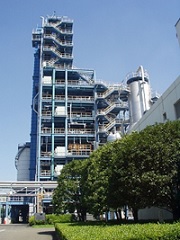Showa Denko K.K. announced that it has obtained a license to process industrial waste, and started to accept crushed & molded used plastics.
Since 2003, SDK’s Kawasaki Plant, which is located in Kawasaki City, Kanagawa Prefecture, has been operating its plastic chemical recycling business, a business to recycle used plastics as raw materials for chemicals under the provisions of Containers and Packaging Recycling Law. SDK calls this business Kawasaki Plastic Recycling (KPR).
The plant serves to gasify used plastics under high temperature, and decompose them to the level of molecules. Then gasified plastics are converted into hydrogen (low-carbon hydrogen) and carbon dioxide (CO2). We use low-carbon hydrogen as raw material to produce ammonia, and CO2 as raw material to produce dry ice and carbonated drinks.
SDK is one of the most experiences companies in long-term commercial operation of plastic chemical recycling through gasification. SDK obtained the license to process industrial waste as a response to the increase in such social needs. In addition, this license enables SDK to diversify sources of used plastics. Thus, SDK has established a used-plastics procurement system that supports stable operation of KPR.
Among 9 million tons of used plastics discharged in Japan every year, 7.5 million tons are reused (390,000 tons are reused through chemical recycling, 2,080,000 tons are reused through material recycling, and 5,030,000 tons are reused through thermal recycling), and 1.42 million tons are not reused but incinerated or landfilled. Chemical recycling of plastics converts used plastics into raw materials and enables society to reuse them. Therefore, chemical recycling of used plastics attracts people’s attention as one of key technologies that help people realize recycling oriented society.
Kawasaki City is recognized as Eco-town by the Ministry of Economy, Trade and Industry. In July 2015, SDK and Kawasaki City concluded an agreement to cooperatively promote realization of society where low-carbon hydrogen with low environmental burden is utilized. SDK has been conducting demonstration experiments in which SDK supplies low-carbon hydrogen to fuel cells installed in a hotel located in Kawasaki City and a hydrogen station for fuel-cell vehicles. SDK conducts these demonstration experiments as “Demonstration Projects to Promote Local Consumption of Locally Produced Low-carbon Hydrogen Gas Made from Used Plastics” which has been commissioned by the Ministry of Environment.
